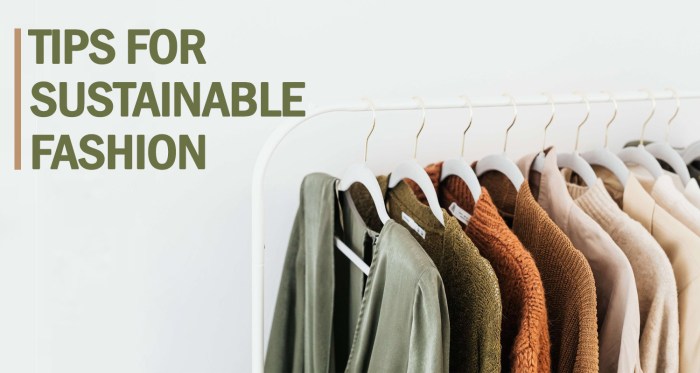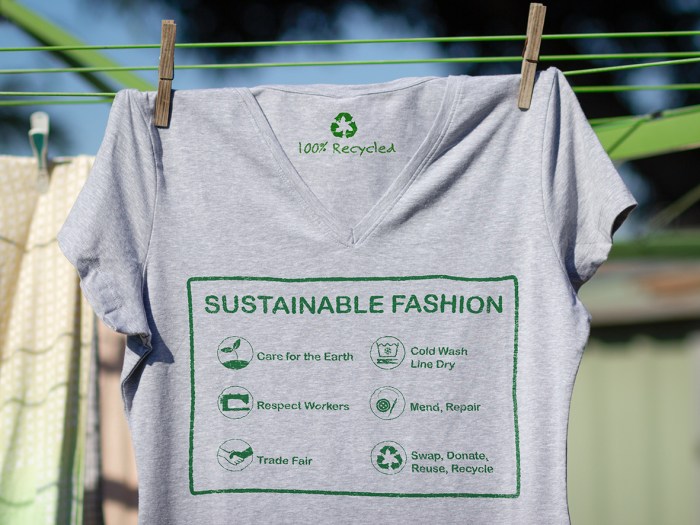Sustainable fashion tips are all the rage for the eco-conscious Generation Z, bringing style and sustainability together in perfect harmony. From choosing the right fabrics to shopping ethically, this guide has got you covered with the latest trends and practices.
Importance of Sustainable Fashion
In today’s world, sustainable fashion plays a crucial role in reducing the environmental impact of the fashion industry. By opting for sustainable practices, we can help minimize waste, decrease carbon emissions, and conserve natural resources.
Positive Impacts of Sustainable Fashion
- Reduced Waste: Sustainable fashion focuses on creating clothing items that are durable and long-lasting, reducing the amount of clothing that ends up in landfills.
- Lower Carbon Footprint: By using eco-friendly materials and production processes, sustainable fashion helps reduce greenhouse gas emissions that contribute to climate change.
- Conservation of Resources: Sustainable fashion promotes the use of recycled materials, organic fabrics, and ethical production methods, preserving valuable resources like water and energy.
Benefits of Incorporating Sustainable Fashion Tips
- Environmental Protection: By embracing sustainable fashion tips, individuals can contribute to protecting the planet for future generations by supporting eco-friendly practices.
- Ethical Responsibility: Choosing sustainable fashion allows consumers to align their values with their purchasing decisions, supporting fair labor practices and responsible production methods.
- Personal Style Statement: Sustainable fashion offers unique and innovative design options that allow individuals to express their personal style while making a positive impact on the environment.
Sustainable Fabric Choices

When it comes to sustainable fashion, choosing the right fabric is crucial in reducing environmental impact. By opting for eco-friendly materials, we can help promote a more sustainable future for the fashion industry.
Traditional fabrics like cotton, polyester, and nylon often have a significant environmental footprint due to their high water usage, chemical treatments, and non-biodegradable nature. On the other hand, sustainable fabric alternatives offer a more eco-conscious choice, with lower water consumption, less chemical use, and biodegradable properties.
Eco-Friendly Fabric Options
- Organic Cotton: Grown without harmful pesticides and synthetic fertilizers, organic cotton reduces water pollution and promotes soil health.
- Tencel (Lyocell): Made from sustainably sourced wood pulp, Tencel production uses closed-loop systems that recycle water and solvents.
- Hemp: A versatile and durable material, hemp requires minimal water and pesticides to grow, making it a sustainable choice.
Recognizing Sustainable Fabrics
- Look for certifications like Global Organic Textile Standard (GOTS) and OEKO-TEX Standard 100 to ensure the fabric meets eco-friendly standards.
- Check the label for materials like recycled polyester, bamboo, or linen, which are often more sustainable options.
- Research brands that prioritize sustainability and transparency in their supply chain to find clothing made from sustainable fabrics.
Ethical Fashion Practices

Ethical fashion practices focus on ensuring fair treatment of workers, reducing harm to the environment, and promoting transparency in the supply chain. By supporting brands that prioritize ethical considerations, consumers can contribute to a more sustainable and responsible fashion industry.
Leading Ethical Fashion Brands, Sustainable fashion tips
- Patagonia: Known for its commitment to environmental sustainability, fair labor practices, and transparency in the supply chain.
- Everlane: Emphasizes transparent pricing, ethical factories, and sustainable materials in their clothing production.
- People Tree: A pioneer in Fair Trade fashion, ensuring fair wages and safe working conditions for artisans and workers.
Importance of Fair Labor Practices
Fair labor practices are essential in sustainable fashion to ensure that workers are not exploited in the production process. By providing fair wages, safe working conditions, and respecting workers’ rights, brands can create a more ethical and equitable fashion industry.
Sustainable Fashion Tips for Consumers
Building a sustainable wardrobe is not only good for the environment but also for your wallet. By following these tips, you can make a positive impact while still looking stylish.
Extend Lifespan of Clothing
- Wash clothes in cold water and air dry to prevent shrinking and fading.
- Use a clothesline or drying rack instead of a dryer to save energy and preserve fabric.
- Repair clothing items instead of throwing them away when they have minor damages.
- Rotate your clothes regularly to avoid excessive wear and tear on specific items.
Shopping Sustainably on a Budget
- Shop at thrift stores or consignment shops to find unique pieces at affordable prices.
- Host clothing swaps with friends to refresh your wardrobe without spending money.
- Look for sales or discounts on sustainable brands to get high-quality items at a lower cost.
- Invest in versatile pieces that can be mixed and matched to create multiple outfits.